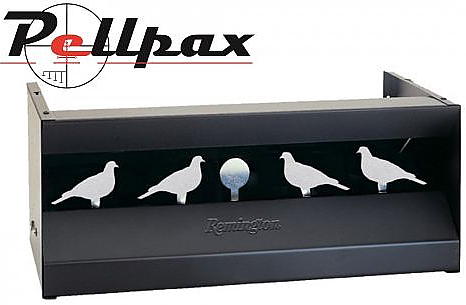Cleaning a CO2
Pistol & Air Rifles
Anyone who has purchased their first CO2 pistol or air rifle and researched 'how to
clean and oil' them on the internet is likely to end up confused
due to the mass of contradictions from the various advisors and
reviewers. Do you clean it often, very rarely, or in the view of some
reviewers, they never clean their air guns, especially the barrels. Do
you use silicone oil, mineral oil or the age old Mobil One synthetic oil
from the local garage. Do you use a pull through or a thin brass rod
with a swivel handle, and with brass, nylon, mop and patch heads for
cleaning the barrel. One thing is for sure, you do not use penetration
oil, the kind you would use for freeing up that stubborn nut which is
rusted and seized underneath your car - apparently penetration oil is a
killer of the internal workings of air weapons.
I clean all my air
guns after I fire off about 500 rounds of lead pellets, usually the
number in an average tin and I like a nice clean and gleaming barrel
without any residual oil left in it. I clean and oil the outer metalwork
and easy to reach mechanicals like the trigger and moving metal parts
with the appropriate gun oil to prevent wear and corrosion. Likewise the
stock with a light waxing and polishing. For long term storage, I will
pull a lightly oiled patch through the barrel before placing it in the
gun cabinet. The only gun I am prepared to strip down (once a year)
to the internals is my CO2 Beretta pistol so that I can clean and oil
the cocking slide mechanism.
For my CO2 pistols, I only use
Crosman Pellgun Oil for internal
and external workings of my guns and fire
VFG Fibre Cleaning Pellets through
the barrels until they come out clean. I catch them in a metal bucket but be
careful they come out of the barrels with a fair amount of velocity and
will easily shoot through any plastic container held at the front of the
barrel. All
my CO2 pistols are stored (empty of CO2 or pellets) upside down with a
drop of
Crosman Pellgun Oil on the CO2 seal
inside the butt.
For my break barrel air rifle, I use a bog standard
Guntuff Cleaning Kit which includes
a brass rod with swivel handle, bronze, nylon and mop heads along with
Napier Power Air Gun Oil and finish
off by firing
VFG Fibre Cleaning Pellets through
the barrel. NOTE: if you also have the
Napier Pull Through Kit you can
use that instead of the VFG fibre pellets. For springers with an under
lever cocking action, you can use the Napier Pull Through Kit through
the breech opening to clean the barrel. NOTE: I never use a silicone based oil for cleaning and oiling
my break barrel gun as it can mess up the internal greasing.
With PCP air weapons which have a magazine or under lever cocking
piston/spring air rifles, it is often the case that using a rod and
various cleaning heads is impossible to use, because the risk of
damaging the weapon internals is very likely. The solution is a 'pull
through cleaning kit and the
Napier Pull Through Kit is
exceptional for all air guns and perfect for PCP rifles which have
magazine systems. It is supplied (in the kit) with a pull string,
patches and
Napier Power Air Gun Oil which is approved by a large number of air
weapon manufacturers. NOTE: I never use a silicone based oil for oiling
my Logan PCP rifle as it can mess up the
internal greasing. This came as a warning in my Logan PCP handbook.
Pellets
In the UK due to the 12ft/lb restriction for air rifles, the most
popular calibre of pellets are .177 for target shooting and .22 for
hunting vermin. The .177 delivers a flatter trajectory whist the .22
tends to arc its way to the target, especially
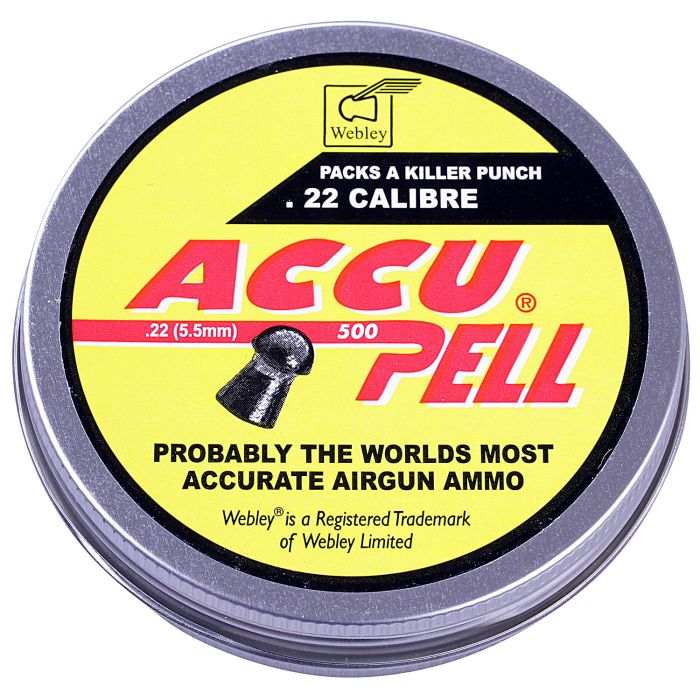 at longer distances. I
use .177 for my CO2 pistols and currently .22 for my air rifles but I am
planning to get a .177 PCP air rifle bullpup or carbine in 2021 as I
only fire at targets and not wildlife.
at longer distances. I
use .177 for my CO2 pistols and currently .22 for my air rifles but I am
planning to get a .177 PCP air rifle bullpup or carbine in 2021 as I
only fire at targets and not wildlife.
The range of pellets which are available is staggering and you could
spend a great deal of time attempting to establish what pellet is most
suitable for your air rifle. To make matters worse they invariable come
in different head sizes for a tighter fit in the barrel. One has to be
careful as too large a head size might not suit your PCP gun's magazine
and either jam it or leave lead fragmentations inside it.
As an example,
my Logan MK II .22 PCP air rifle will not accept any other
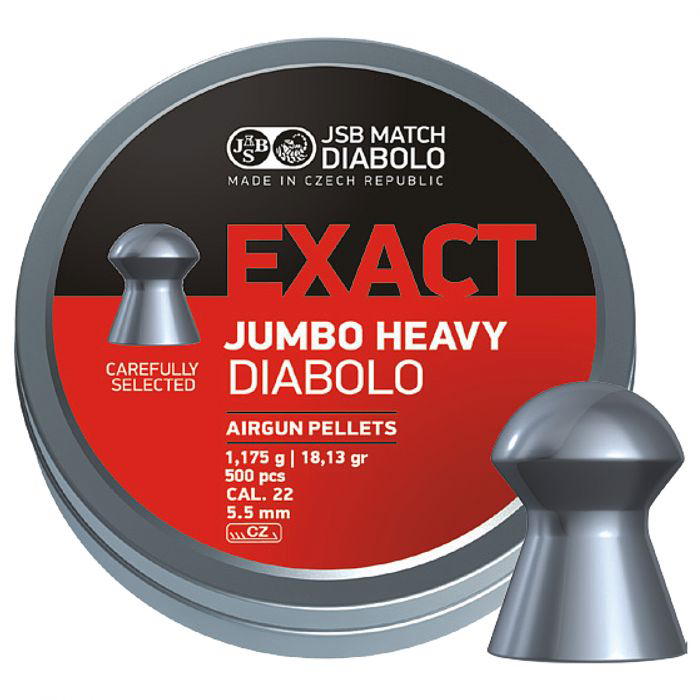 pellet than a Accupell
.22 14.66gr 5.50mm head size which is especially recommended for using
with the gun. Recently, I was using the same Accupell pellets in my
Weihrauch HW80 break barrel springer which were fairly slack in the
barrel, so I tried out some JSB Jumbo Exact Heavy Diablo Pellets 18.13gr .22 with a larger 5.52mm head
and wow, the consistent accuracy was
awesome and the velocity, distance and target impact were exceptional -
now my favourite pellet for my HW80.
pellet than a Accupell
.22 14.66gr 5.50mm head size which is especially recommended for using
with the gun. Recently, I was using the same Accupell pellets in my
Weihrauch HW80 break barrel springer which were fairly slack in the
barrel, so I tried out some JSB Jumbo Exact Heavy Diablo Pellets 18.13gr .22 with a larger 5.52mm head
and wow, the consistent accuracy was
awesome and the velocity, distance and target impact were exceptional -
now my favourite pellet for my HW80.
Pellets Preparation
Upon delivery I gently pop my pellets into a basin full of
warm water mixed with washing up liquid and gently swirl them around for
a time using my fingers. Afterwards, I empty most of the water and pop
the pellets into a household sieve and then gently onto an old thick
towel. I spread them out and dry them with a hairdryer. I move them to a
dry towel and lightly spray them all with
Napier Pellet Lube or
Napier Power Air Gun Oil and then
gently roll them inside the 'folded' towel to remove the excess
oil which leaves an almost invisible oil coating. Thereafter, they are popped into
a
Crosman Pellet Pouch and ready for
use. NOTE: I never use a silicone based oil for my air rifle
pellets.
Target Shooting
I very much enjoy using my air weapons
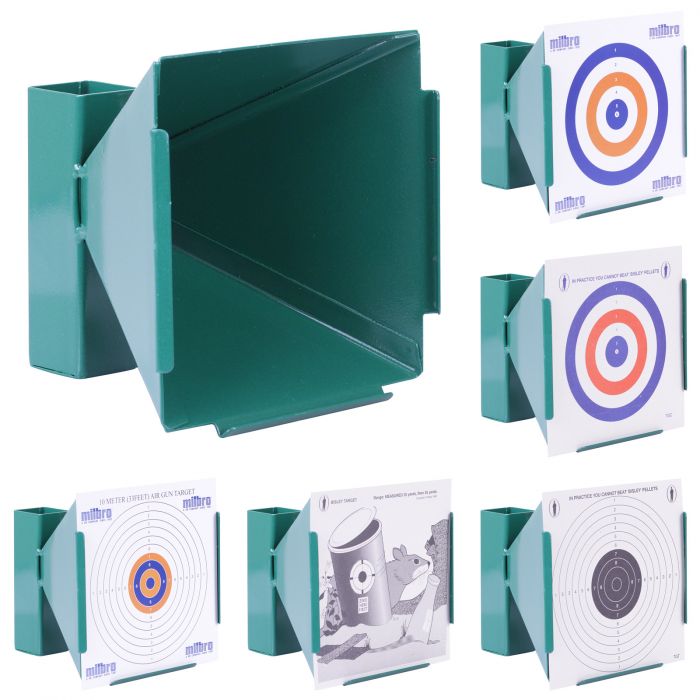 to
shoot at paper & metal targets. Although I am surrounded by all types of
wildlife, including crows, magpies, rabbits, grey squirrels, pigeons,
deer, pheasants, foxes and sparrows, amongst many other small birds, I
never shoot any wildlife.
to
shoot at paper & metal targets. Although I am surrounded by all types of
wildlife, including crows, magpies, rabbits, grey squirrels, pigeons,
deer, pheasants, foxes and sparrows, amongst many other small birds, I
never shoot any wildlife.
Paper & Metal Targets
Air gun targets come in all shapes and sizes but as I predominantly
shoot lead pellets, I prefer to catch the spent lead, rather than let it
build up in my fields. Therefore all my targets catch the lead after it
has passed through the paper. I like
17mm and also
14mm metal coned target holders
with a spent pellet trap at the back. I purchased mine from
Ramsbottom in the UK where I also
purchase the majority of my accessories and pellets.
PellPax in the UK, supplies many
types of targets and I like the metal box targets with little figures
(pigeons, crows, ducks, rats) which have a reset figure that when hit,
pops back up all the shot down figures - great fun and a test of
accuracy.
Gun Safes
& Trigger Locks
Gun Safes & Cabinets come in all
shapes,
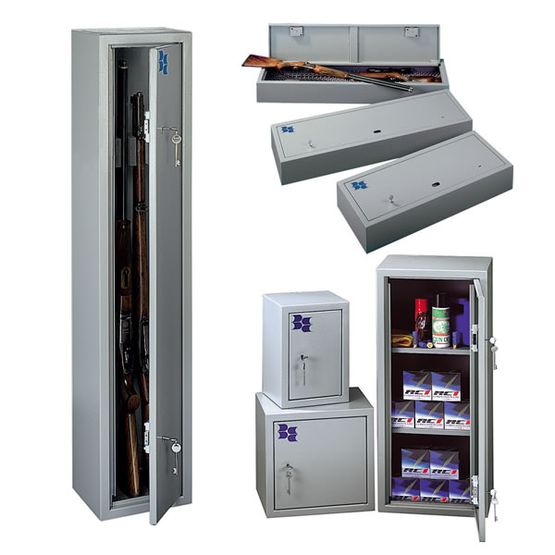 sizes
and costs. If you only have a single firearm, then the cost can be
relatively low but no matter what the size and the cost, the locked safe
or cabinet must be bolted to a solid wall and preferably in a place
where it cannot be easily found by third parties, somewhere like inside
a locked cupboard with a solid wall at the back.
sizes
and costs. If you only have a single firearm, then the cost can be
relatively low but no matter what the size and the cost, the locked safe
or cabinet must be bolted to a solid wall and preferably in a place
where it cannot be easily found by third parties, somewhere like inside
a locked cupboard with a solid wall at the back.
It is prudent to purchase a gun safe or cabinet that can hold a few
firearms because invariably your hankering for another gun, often
arises. It is not just the gun that must
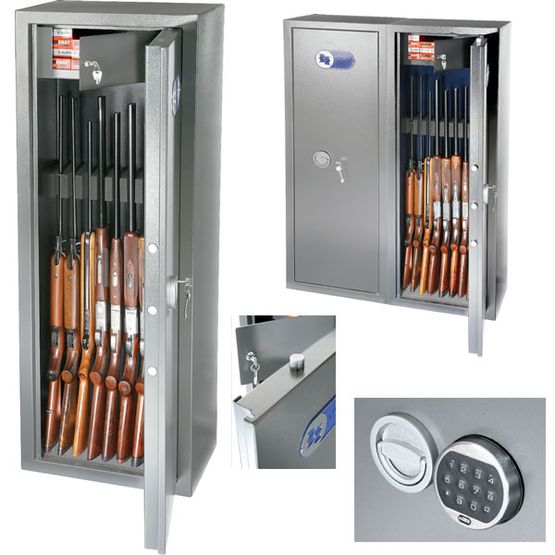 be
stored securely, often a scope is fitted, so the safe or cabinet must
provide room for the gun to stand with the scope fitted and then there
is the height to consider, because your 1st gun may be a short carbine
but a 2nd gun,
be
stored securely, often a scope is fitted, so the safe or cabinet must
provide room for the gun to stand with the scope fitted and then there
is the height to consider, because your 1st gun may be a short carbine
but a 2nd gun,
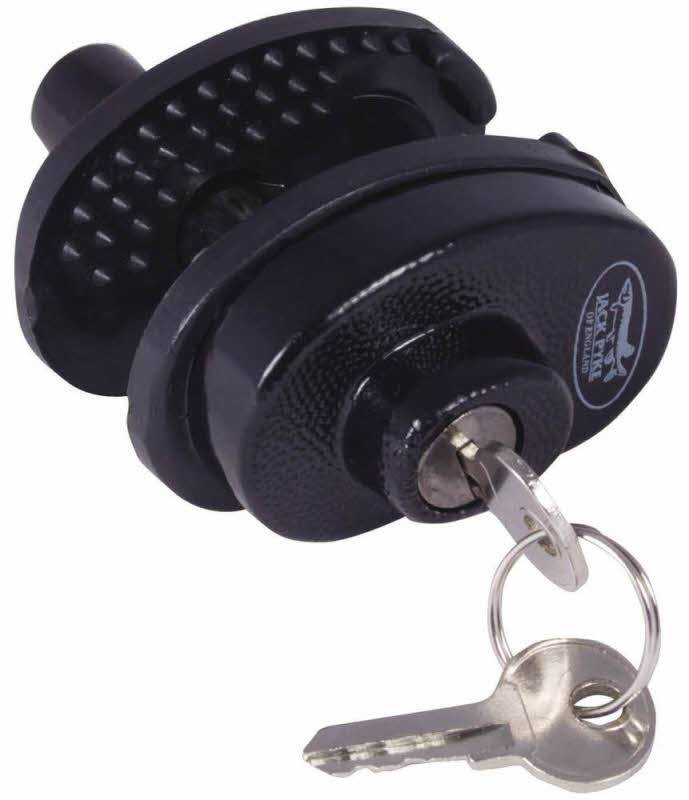 purchased
at a later date, might be a full size rifle with a silencer fitted.
purchased
at a later date, might be a full size rifle with a silencer fitted.
Then there is the ammunition and any accessories that you might want to
store alongside your gun - many cabinets have side and/or top storage
sections. Pellets, targets and airgun cleaning equipment are often
stored in gun safes. If you have several guns, the safe should have
enough room whereby you can insert or remove a gun without it clattering
into another gun in the cabinet.
Anyone who is careful about securing their gun from third parties,
especially kids, will secure their air rifle with a
Trigger Lock which prevents the
guns trigger being pulled and usually these type of locks come with 2
keys.
If you have
enjoyed this
article -
please
donate to my
charity of
choice
-
The Sick Kids
Richard
Lawrence
Scotland
United
Kingdom
